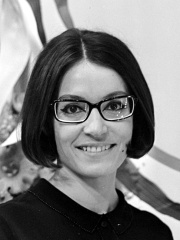

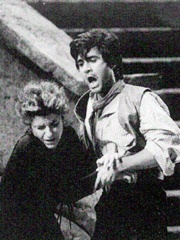


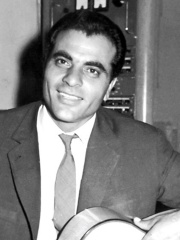
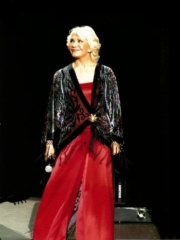

The Most Famous
SINGERS from Greece
This page contains a list of the greatest Greek Singers. The pantheon dataset contains 4,381 Singers, 30 of which were born in Greece. This makes Greece the birth place of the 31st most number of Singers behind Bosnia and Herzegovina, and Romania.
Top 10
The following people are considered by Pantheon to be the top 10 most legendary Greek Singers of all time. This list of famous Greek Singers is sorted by HPI (Historical Popularity Index), a metric that aggregates information on a biography's online popularity. Visit the rankings page to view the entire list of Greek Singers.

1. Nana Mouskouri (b. 1934)
With an HPI of 75.87, Nana Mouskouri is the most famous Greek Singer. Her biography has been translated into 66 different languages on wikipedia.
Ioanna "Nana" Mouskouri (Greek: Ιωάννα "Νάνα" Μούσχουρη [i.oˈana ˈnana ˈmusxuri]; born 13 October 1934) is a Greek singer and politician. Over the span of her career, she has released an estimated 450 albums in at least thirteen languages, including Greek, French, English, German, Dutch, Portuguese, Italian, Japanese, Spanish, Hebrew, Welsh, Mandarin Chinese and Corsican. Mouskouri became well known throughout Europe for the song "The White Rose of Athens", recorded first in German as "Weiße Rosen aus Athen" as an adaptation of her Greek song "Σαν σφυρίξεις τρείς φορές" (San sfyríxeis tris forés, "When you whistle three times"). It became her first record to sell over one million copies. Later, in 1963, she represented Luxembourg at the Eurovision Song Contest with the song "À force de prier", finishing eighth. Her friendship with the composer Michel Legrand led to the recording by Mouskouri of the theme song of the Oscar-nominated film The Umbrellas of Cherbourg. From 1968 to 1976, she hosted her own TV show produced by BBC, Presenting Nana Mouskouri. Her popularity as a multilingual television personality and distinctive image, owing to the then unusual signature black-rimmed glasses, turned Mouskouri into an international star. "Je chante avec toi Liberté", recorded in 1981, is perhaps her biggest hit, performed in at least five languages – French, English as "Song for Liberty", German as "Lied der Freiheit", Spanish as "Libertad" and Portuguese as "Liberdade". "Only Love", a song recorded in 1984 as the theme song of TV series Mistral's Daughter, gained worldwide popularity along with its other versions in French (as "L'Amour en Héritage"), Italian (as "Come un'eredità"), Spanish (as "La dicha del amor"), and German (as "Aber die Liebe bleibt"). It became her only UK hit single when it reached number two in February 1986. Mouskouri became a spokesperson for UNICEF in 1993. She was elected to the European Parliament as a Greek deputy from 1994 to 1999. In 2006, she was a special guest on Eurovision Song Contest 2006's final, presented as the best selling artist of all time. In 2015, she was awarded the Echo Music Prize for Outstanding Achievement by the German music association Deutsche Phono-Akademie.

2. Vicky Leandros (b. 1949)
With an HPI of 67.87, Vicky Leandros is the 2nd most famous Greek Singer. Her biography has been translated into 43 different languages.
Vasiliki Papathanasiou (Greek: Βασιλική Παπαθανασίου, IPA: [vasiliˈci papaθanaˈsi.u]; born 23 August 1949), known professionally as Vicky Leandros (Greek: Βίκυ Λέανδρος, IPA: [ˈvici ˈle.anðros]), is a Greek-born German singer. She is the daughter of singer, musician and composer Leandros Papathanasiou (also known as Leo Leandros as well as Mario Panas). In 1967, she achieved worldwide fame after gaining fourth place for the country of Luxembourg in the Eurovision Song Contest with the song "L'amour est bleu", which became a worldwide hit. She further established her career by winning the Eurovision Song Contest in 1972 with the song "Après toi", again representing Luxembourg. On 15 October 2006, Vicky Leandros was elected town councillor of the Greek harbour town of Piraeus on the PASOK list. Her task concerned the cultural and international development of Piraeus. She was also Deputy Mayor of Piraeus. It was announced in June 2008 that Leandros decided to leave her position in Greek politics with immediate effect, stating that she had underestimated the workload and time needed to fulfil her political obligations and that it had become impossible to combine those duties with her singing career.

3. Agnes Baltsa (b. 1944)
With an HPI of 65.63, Agnes Baltsa is the 3rd most famous Greek Singer. Her biography has been translated into 27 different languages.
Agni Baltsa (Greek: Aγνή Mπάλτσα; also known as Agnes Baltsa; born 19 November 1944) is a leading Greek mezzo-soprano singer. Baltsa was born in Lefkada. She began playing piano at the age of seven, before moving to Athens in 1958 to concentrate on singing. She graduated from the Greek National Conservatoire in 1965 and then travelled to Munich to continue studying on a Maria Callas scholarship. Baltsa made her first appearance in an opera in 1968 as Cherubino in The Marriage of Figaro at Frankfurt Opera, before going on to appear as Octavian in Der Rosenkavalier at the Vienna State Opera in 1970. Under the guidance of Herbert von Karajan, she became a regular at the prestigious Salzburg Festival. She became Kammersängerin of the Vienna State Opera in 1980. Her best-known performance is that of Carmen by Georges Bizet, which she has sung a number of times with noted tenors such as José Carreras, Neil Shicoff, and others. She has also sung works by Mozart (notably Così fan tutte), Rossini (Il Barbiere di Siviglia, La Cenerentola, Semiramide, L'italiana in Algeri), Mascagni (Cavalleria Rusticana), Saint-Saëns (Samson et Dalila), Verdi (Aida, La forza del destino, Il trovatore, Don Carlos), Bellini (I Capuleti e i Montecchi), Offenbach (Les Contes d'Hoffmann) and Donizetti (Il Campanello, Maria Stuarda). She starred in the Austrian film Duett in 1992, playing an opera singer. In 2017, she sang Klytemnestra in Richard Strauss's Elektra at the Greek National Opera's new premises at the Stavros Niarchos Foundation Cultural Center.

4. Maria Farantouri (b. 1947)
With an HPI of 62.33, Maria Farantouri is the 4th most famous Greek Singer. Her biography has been translated into 25 different languages.
Maria Farantouri or Farandouri (Greek: Μαρία Φαραντούρη; born 28 November 1947) is a Greek singer and also a political and cultural activist. She has collaborated with Greek composers such as Mikis Theodorakis, who wrote the score for Pablo Neruda's Canto General, which Farantouri performed worldwide. During the Greek military junta of 1967–1974, Maria Farantouri recorded protest songs in Europe with Mikis Theodorakis. In 1971, she recorded Songs and Guitar Pieces by Theodorakis with Australian guitarist John Williams which included seven poems by Federico García Lorca. She has recorded songs in Spanish ('Hasta Siempre Comandante Che Guevara'), Italian, and English ("Joe Hill" and Elisabeth Hauptmann's Alabama Song from Bertolt Brecht's Rise and Fall of the City of Mahagonny), George Gershwin's works, as well as works by Greek composers Manos Hatzidakis, Eleni Karaindrou and Vangelis. Her voice is contralto with two octaves. Maria Farantouri was an elected member of the Greek Parliament from 1989 to 1993 representing the Panhellenic Socialist Movement (PASOK). She is married to the poet and former politician Tilemachos Chytiris. On 23 September 2004, the President of the Hellenic Republic recognized the contribution of Maria Farantouri to Greek song, awarding her the Gold Cross of the Order of the Phoenix. She was awarded the 2014 Premio Tenco for her contribution to international contemporary and traditional music, and the Spanish LiberPress 2017.

5. Haris Alexiou (b. 1950)
With an HPI of 62.19, Haris Alexiou is the 5th most famous Greek Singer. Her biography has been translated into 26 different languages.
Haris Alexiou (Greek: Χάρις Αλεξίου, pronounced [ˈxaris aleˈksiu]; born 27 December 1950) is a Greek singer whose career has spanned over 5 decades. She is one of the most popular singers in Greece. She has worked with important Greek songwriters and composers, has performed at top musical theatres all over the world, and has received several awards. She has recorded over thirty albums and has been featured on albums of other musicians. On 14th March 2010, Alpha TV ranked Alexiou as the first top-certified female artist in Greece in the phonographic era (since 1960). She is the highest selling Greek female artist and third overall, behind George Dalaras and Yiannis Parios. Eight of her personal albums released between 1977 and 2003 have totaled 1.5 million sales, the only Greek female artist to do so. She also has an audience in Turkey and her various songs were sung in Turkish especially "Ola Se Thimizoun" (Everything reminds me of you) as "Olmasa Mektubun" (Without your letter) by Yeni Türkü, Erol Evgin, Müslüm Gürses, Sevda Karababa and Pilli Bebek; Teli Teli Teli as "Telli Telli" (Demoiselle, demoiselle), Pes Mou Pos Ginetai (Tell me, how is it possible?) as "Maskeli Balo" (Masquerade) by Yeni Türkü, Athena and Ata Demirer; Mia Pista Apo Fosforo (A floor of phosphorus) as "Her şeyi yak" by (Burn everything) Sezen Aksu and Duman and as "Nefes Almak İstiyorum" (I want to breathe) by Yonca Evcimik; Krata Gia To Telos (Keep it to the end) as "Sebahat Abla" (Elder sister Sebahat) by Müslüm Gürses; Fevgo (I'm leaving") as "Durma Yağmur" (Rain don't stop) by Gripin. She has lived in Athens since 1958, when she and her family moved there from Thebes. Her grandmother's family migrated to Thebes in 1924 from Smyrna. Her name was given to a street in Gaziemir, in İzmir province, Turkey.

6. George Dalaras (b. 1949)
With an HPI of 61.27, George Dalaras is the 6th most famous Greek Singer. His biography has been translated into 28 different languages.
George Dalaras (Greek: Γιώργος Νταλάρας, born 29 September 1949) is a Greek singer and musician. He is one of the most prominent figures of Greek music. In October 2006, he was selected as a Goodwill Ambassador for the UN Refugee Agency. He was born in Piraeus. His first memories of music were the basic forms of Greek music, such as traditional, folk, rebetiko, laïka, which influenced him as an artist. In addition, he has performed many other music genres in several different languages, such as pop, rock, latin, contemporary, byzantine music, classical, opera etc. He has collaborated with many Greek and foreign artists (composers, poets, maestros, musicians, etc). In all, he has released almost 90 personal albums and has collaborated in more than 150 others as singer, musician or producer. He is the Greek artist who has performed the biggest concerts of all time, both in Greece and abroad. He has performed at some of the most famous concert halls and stadiums all over the world, and has collaborated with many of the most renowned symphonic orchestras of the world. He has received several honors and awards including Cyprus citizenship, the "Kennedy" Award and the UNHCR Goodwill Ambassadorship.

7. Stelios Kazantzidis (1931 - 2001)
With an HPI of 61.11, Stelios Kazantzidis is the 7th most famous Greek Singer. His biography has been translated into 15 different languages.
Stelios Kazantzidis (Greek: Στέλιος Καζαντζίδης; 29 August 1931 – 14 September 2001) was one of the most prominent Greek singers. He was of Pontian and Asia Minor roots. A top artist of Greek music, or Laïkó, he collaborated with many of Greece's foremost composers.

8. Marinella (b. 1938)
With an HPI of 59.72, Marinella is the 8th most famous Greek Singer. Her biography has been translated into 19 different languages.
Kyriaki Papadopoulou (Greek: Κυριακή Παπαδοπούλου; born 19 May 1938), known by her stage name Marinella (Greek: Μαρινέλλα), is a Greek singer whose career has spanned several decades. She is well regarded due to her impressive vocal range. Since the beginning of her professional singing career in 1956, she has released 66 solo albums, and has also been featured on many albums by other musicians. She represented Greece in the Eurovision Song Contest 1974, becoming the first ever Greek entrant in the contest. From 1956 to 2024, Marinella remained active for 68 years, performing in concerts and weekly shows at nightclubs. On September 25, 2024, at the age of 86, she suffered a severe hemorrhagic stroke while performing at the Odeon of Herodes Atticus in Athens, collapsing on stage. After four months of hospitalization, on January 21, 2025, she was discharged from the hospital and returned home.

9. Sakis Rouvas (b. 1962)
With an HPI of 58.38, Sakis Rouvas is the 9th most famous Greek Singer. His biography has been translated into 51 different languages.
Anastasios "Sakis" Rouvas (Greek: Αναστάσιος "Σάκης" Ρουβάς, pronounced [ˈsacis ruˈvas]; born 5 January 1972), also known mononymously as Sakis, is a Greek singer, actor, businessman and former pole vaulter. Born in Corfu, Rouvas won medals with Greece's U18 and U20 national athletics team during the 1980s before pursuing a music career. He rose to fame in 1991 with his debut album and became one of Greece's most prominent musical artists, with numerous number-one albums and singles—most of which have been certified platinum or higher—as well as widely attended tours and live shows. Over the course of his career, he has released fourteen studio albums, including five under PolyGram Records and nine under Minos EMI. His entry for the Eurovision Song Contest 2004, "Shake It" became one of the best-selling CD singles in Greece. In addition to maintaining a successful recording career, Rouvas has also expanded into acting, television presenting, and business. Rouvas has received numerous accolades, including six Arion Music Awards, 15 Pop Corn Music Awards, 26 MAD Video Music Awards, four Status Man of the Year Awards, a Karolos Koun Award from the Union of Greek Theatre and Music Critics, an MTV Europe Music Award and two World Music Awards. A major figure in modern Greek pop culture for over three decades—recognized for his artistic versatility, stage presence, and influence—Rouvas is often cited as one of the country's most recognizable and marketable public figures. Forbes listed him as Greece's third-most influential celebrity and its top-ranked singer. He has been in a relationship with model Katia Zygouli since 2003; the couple married in 2017 and have four children. Rouvas is also involved in philanthropic work, supporting various social and environmental initiatives.
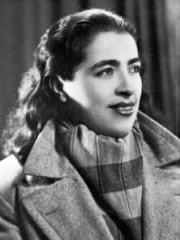
10. Sotiria Bellou (1921 - 1997)
With an HPI of 56.02, Sotiria Bellou is the 10th most famous Greek Singer. Her biography has been translated into 16 different languages.
Sotiria Bellou (Greek: Σωτηρία Μπέλλου; August 22, 1921 – August 27, 1997) was a Greek singer and performer of the rebetiko style of music. She was one of the most famous rebetissa of all. On March 14, 2010, Alpha TV ranked Bellou the 22nd top-certified female artist in the nation's phonographic era (since 1960).
People
Pantheon has 30 people classified as Greek singers born between 1921 and 2006. Of these 30, 25 (83.33%) of them are still alive today. The most famous living Greek singers include Nana Mouskouri, Vicky Leandros, and Agnes Baltsa. The most famous deceased Greek singers include Stelios Kazantzidis, Sotiria Bellou, and Jimmy Makulis. As of April 2024, 5 new Greek singers have been added to Pantheon including Klavdia, Pantelis Pantelidis, and Yannis Ploutarchos.
Living Greek Singers
Go to all RankingsNana Mouskouri
1934 - Present
HPI: 75.87
Vicky Leandros
1949 - Present
HPI: 67.87
Agnes Baltsa
1944 - Present
HPI: 65.63
Maria Farantouri
1947 - Present
HPI: 62.33
Haris Alexiou
1950 - Present
HPI: 62.19
George Dalaras
1949 - Present
HPI: 61.27
Marinella
1938 - Present
HPI: 59.72
Sakis Rouvas
1962 - Present
HPI: 58.38
Glykeria
1953 - Present
HPI: 53.37
Katy Garbi
1961 - Present
HPI: 51.60
Eleftheria Arvanitaki
1957 - Present
HPI: 50.86
Giorgos Alkaios
1971 - Present
HPI: 49.17
Deceased Greek Singers
Go to all RankingsStelios Kazantzidis
1931 - 2001
HPI: 61.11
Sotiria Bellou
1921 - 1997
HPI: 56.02
Jimmy Makulis
1935 - 2007
HPI: 55.14
Agathonas Iakovidis
1955 - 2020
HPI: 54.76
Pantelis Pantelidis
1983 - 2016
HPI: 44.63
Newly Added Greek Singers (2025)
Go to all RankingsKlavdia
2002 - Present
HPI: 46.33
Pantelis Pantelidis
1983 - 2016
HPI: 44.63
Yannis Ploutarchos
1970 - Present
HPI: 44.48
Peggy Zina
1975 - Present
HPI: 42.89
Nikos Oikonomopoulos
1984 - Present
HPI: 40.45
Overlapping Lives
Which Singers were alive at the same time? This visualization shows the lifespans of the 5 most globally memorable Singers since 1700.












